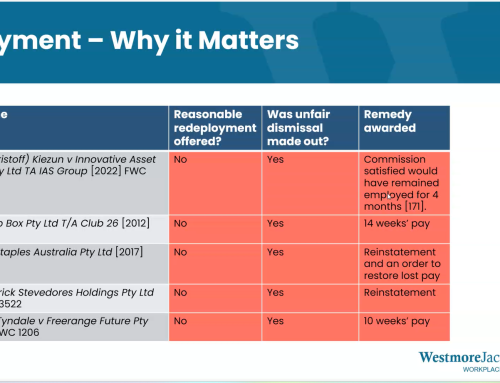In September 2017 we published an article discussing the law regarding capacity-based dismissals. Since then, the law has changed.
CSL Limited T/A CSL Behring v Chris Papaioannou
In clarifying the correct approach to take, the Full Bench of the Fair Work Commission has rejected an earlier Full Bench authority as “plainly wrong”.
CSL Limited
CSL Limited was an appeal from a first instance decision concerning an unfair dismissal application. The application was brought by an employee who was dismissed because their employer believed an illness had left the employee incapable of performing their job.
The employee had been absent from work for around 10 months. The employer sought medical opinions regarding the likelihood of the employee returning to work.
A six-month recovery period was estimated by the employee’s treating Psychiatrist. An Occupational Physician was then engaged by the employer to performed an independent medical examination. Their prognosis was more conservative. In the Occupational Physician’s view, return to work within 12 to 24 months was cautiously possible.
Of the two medical opinions, the employer favoured the Occupational Physician’s. On the basis of that opinion, the employer formed the view the employee was incapable of performing the inherent requirements of their job.
Lion Dairy and Jetstar
Before discussing the appeal in CSL Limited, it is important to consider two prior Full Bench decisions: Lion Dairy and Drinks Milk Limited v Norman [2016] FWCFB 4218 and Jetstar Airways Ltd v Neeteson-Lemkes [2013] FWCFB 9075.
Lion Dairy said, in effect, having a valid medical opinion that an employee cannot perform the inherent requirements of the job is indicative that the employer will have a valid reason for dismissal. Such evidence supports the decision being one that is “sound, defensible and well founded”.
The majority in Lion Dairy also observed that an “employer is entitled, and expected, to reply on expert assessments”. The Commission itself is not in a position to make such expert assessments.
In doing so, the majority suggested an approach whereby the Commission does not look beyond expert medical assessments (to make their own assessment). If there was a medical opinion that an employee cannot perform the inherent requirements of their role, then it would usually follow that the employer had a valid reason to dismiss the employee.
This approach was inconsistent with an earlier Full Bench decision called Jetstar.
Jetstar said, in effect, that it is the Commission’s role to determine whether, at the time of dismissal, the employee suffered the alleged incapacity. In doing so, the Commission will consider all the evidence, including medical evidence, to make a finding whether at the time of the dismissal there was a valid reason to dismiss the employee.
Which approach is correct?
In CSL Limited at first instance, the Commission applied the approach in Lion Dairy and found there was a valid reason for dismissal. The Commissioner considered that it was reasonable for the employer to rely on the Occupational Physician’s opinion.[1] This report formed a “defensible position”.
On appeal, the Lion Dairy approach was rejected. The Full Bench unanimously found that the proper approach is that set out in Jetstar.
The Full Bench held that the Lion Dairy approach was inconsistent with the weight of past judicial approaches and the proper construction of the Fair Work Act 2009 (Cth). The Full Bench said that the approach in Lion Dairy was “plainly wrong”.
The Full Bench in CSL Limited held that it is the Commission’s role to determine, on all the evidence, whether the employee suffered the alleged incapacity at the time of the dismissal.
Such findings by the Commission are necessary to determine whether the employer had a valid reason for dismissal related to the employee’s capacity.
The ‘tension’ between Lion Dairy and Jetstar has been resolved in favour of the approach in Jetstar.
The decision in CSL Limited means that employers should be cautious when considering medical assessments as a basis for lawfully dismissing an employee. All evidence in the circumstances will be relevant and considered by the Commission. Employers should consider seeking legal advice before dismissing an employee for incapacity.
Adam Colquhoun
Principal, WestmoreJacobs
This article is general information only. It is not legal advice. If you need legal advice, please contact us.
[1] The dismissal was found to be harsh on other grounds.






Leave A Comment